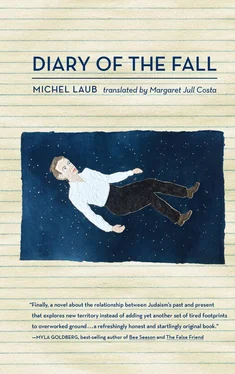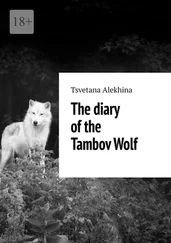11.
In thirty years’ time it will be almost impossible to find anyone who was imprisoned in Auschwitz.
12.
In sixty years’ time it will be very hard to find the son of anyone who was imprisoned in Auschwitz.
13.
In three or four generations the name Auschwitz will have about as much importance as the names Majdanek, Sobibor and Belzec have today.
14.
Does anyone remember now whether it was eighty or eighty thousand people who died in Majdanek, two hundred or two hundred thousand in Sobibor, five hundred or five hundred thousand in Belzec? Does it make any difference thinking in numerical terms, about the fact that Auschwitz and the other camps modeled on Auschwitz killed nearly six million Jews? Did it matter to my father that not only six million Jews were killed, but twenty million other people, if you include Gypsies, Slavs, homosexuals, the physically and mentally disabled, common criminals, prisoners of war, Muslims, atheists, and Jehovah’s Witnesses? Or that it wasn’t in fact just twenty million, but seventy million if you take into account all the other war casualties, the English, Russian, French, Polish, Chinese, American, Greek, Belgian, Spanish, Ukrainian and Swedish, and, yes, even the Japanese, Italians and Germans who died, all of whose deaths were a direct and indirect consequence of the actions of those who built Auschwitz? What did any of that mean to my father? Did it justify the fact that my grandfather did what he did without for a moment considering him or what his life would be like from then on, the burden he would have to carry with him ever after?
15.
My father grew up as my grandfather’s son, and I won’t bother repeating the arguments offered by medicine and psychology and culture that prove how harmful such a model can be, the father figure who did what he did, who discarded his son in the way he did, and I imagine how even the simplest of things must have weighed on my father, school and the shop, the silent suppers with my grandmother, his course in business studies, a few friends, a few girlfriends and the dance where he met my mother, the weight of leaving that dance thinking about her, the first time he phoned her and arranged to go to the cinema and picked her up at her house and held her hand and met her family and gradually grew close enough to discuss the possibility of me being born of that union a few years later.
16.
I imagine what my father felt when he was at the hospital, when my mother was in labor, if it was any different for him than for any other father, if he had to make a special effort to play the role, put on the words and the gestures, the pretense at commitment and support, the external displays of affection, the external embraces, the external smile, not to mention the fact that he was perhaps thinking about my grandfather and waking each day with the fear that he might repeat what my grandfather had done, and looking at me each day thinking that I might become what he was if he became what my grandfather was.
17.
I have been the person I am from very early on, and I wonder if it makes any sense to keep mentioning Auschwitz in this story. But if it doesn’t make any sense to blame Auschwitz for what happened to my grandfather and consequently what happened to my father, how can I make a connection between all of that and the fact that I never again spoke to João? Less than a year after we became friends, I was capable of writing him a note about his mother’s death, and of using his mother’s death to avoid having a physical confrontation with him, because having a physical confrontation would be yet another attack on his integrity, a repetition of what I did on his birthday, because in a fight you don’t think so very differently from when you allow someone to fall flat on his back while the other guests are all singing “Happy Birthday,” the intention is the same, the result is the same if all goes to plan, if I managed to hit him during the fight, if in front of the whole of the eighth grade I managed to land a punch on him or knock him down and kick and stamp and spit in his face to the point where he would never get up again.
18.
I wrote my last note about the death of João’s mother, and went home and stole the bottle of whisky from the cupboard, and locked myself in my room and sat on the bed, and took a deep breath before taking my first swallow, knowing that I would never again say so much as hello to João. I would walk down the corridors averting my face from his, and for the rest of my life I would never again have a conversation in which I mentioned his name, because that would be a reminder of what I was capable of doing to him not just once but over and over again. How could the impact of that discovery be mitigated or justified by what I had recently learned about Auschwitz? Because even though Auschwitz was considered to be the greatest tragedy of the twentieth century, and that includes the millions of people who have died in wars and massacres and under all kinds of regimes, a mere bureaucratic statistical account of the victims who disappeared all that time ago, even my grandfather, and even my father indirectly, not one of those victims was anywhere near as important to me as João was when I was fourteen.
19.
It was around then that I started to drink, and I could even list the things I ruined because of that in the years that followed. A job, because I couldn’t wake up early enough. A car, which I wrote off in an accident and in which the guy I was giving a lift to fractured his arm. My first two marriages, which in one way or another ended because of that.
20.
My first wife was from Porto Alegre, and we lived in her apartment before I moved to São Paulo. I hadn’t even finished my journalism degree when I received an invitation to work for a magazine. She was a psychologist and had already built up a practice and, right from the start, we knew that it was highly unlikely that she would move to São Paulo, as unlikely as my return to a city where I would soon have no friends and nothing to do, and then it was just a matter of time before I began to rehearse in my head the inevitable conversation, the holiday weekend when I grew tired of hiding the fact that I’d already met the woman who would become my second wife.
21.
On that holiday weekend I told her everything, immediately after I woke up, in Porto Alegre. I was due to go back to São Paulo that evening. On holidays we spent the mornings in bed. My first wife used to read the newspaper with me. She thought that because I was a journalist I would enjoy discussing the different sections, the opinion pieces and the classifieds. We used to have lunch at home, she liked cooking, and my flight was nearly always in the late afternoon, because the next day I had to be at work, and at around five o’clock, she would take me to the airport and I always used to imagine what the last time would be like, if she would still give me a lift, if there would be a farewell embrace or kiss, in the lobby or next to the sign for domestic flights, or if I would leave without looking back and take the stairs so as to reach the street more quickly and hail a taxi while she stared at the closed door and the empty apartment and the unmade bed and only then would she shrink into herself and take a deep breath and close her eyes and then somehow subside into an agony that overwhelmed every part of her body.
22.
I broke the news to her as objectively as I could, and although I spoke about sadness and sorrow and guilt, what I remember most vividly is a shameful feeling of relief, and of all the things I learned from the years I spent with my first wife, that is, the lessons that a first relationship always teaches you, the first time a woman says she loves you, the first time you accept that and how you deal with it, and how you cope with the endless problems it brings, the way you speak, the way you dress, how selfish, inconsiderate, lying and manipulative you are, how unfaithful, immature and untrustworthy you are, both emotionally and as regards ordinary domestic matters, all of which only compounds the sense of oppression felt by your partner, in short, of all the things I learned in those years when I was ceaselessly accused and judged and condemned by my first wife, for being the way I was and always would be because of my lack of effort and commitment to her, the most important thing is the certainty that I made the right decision on that holiday morning.
Читать дальше












